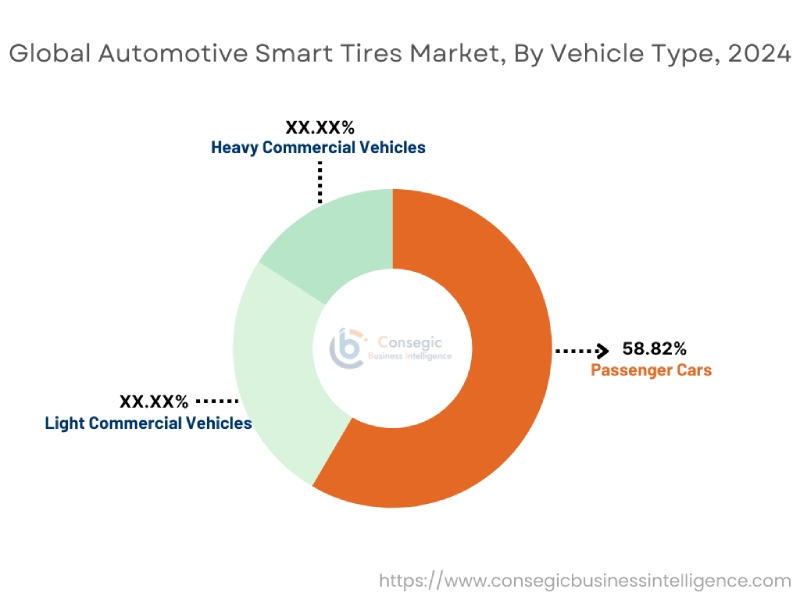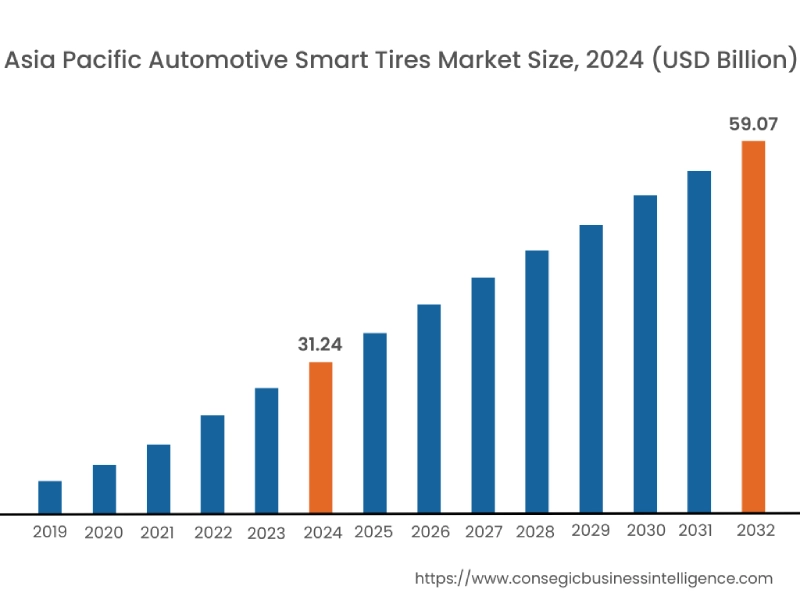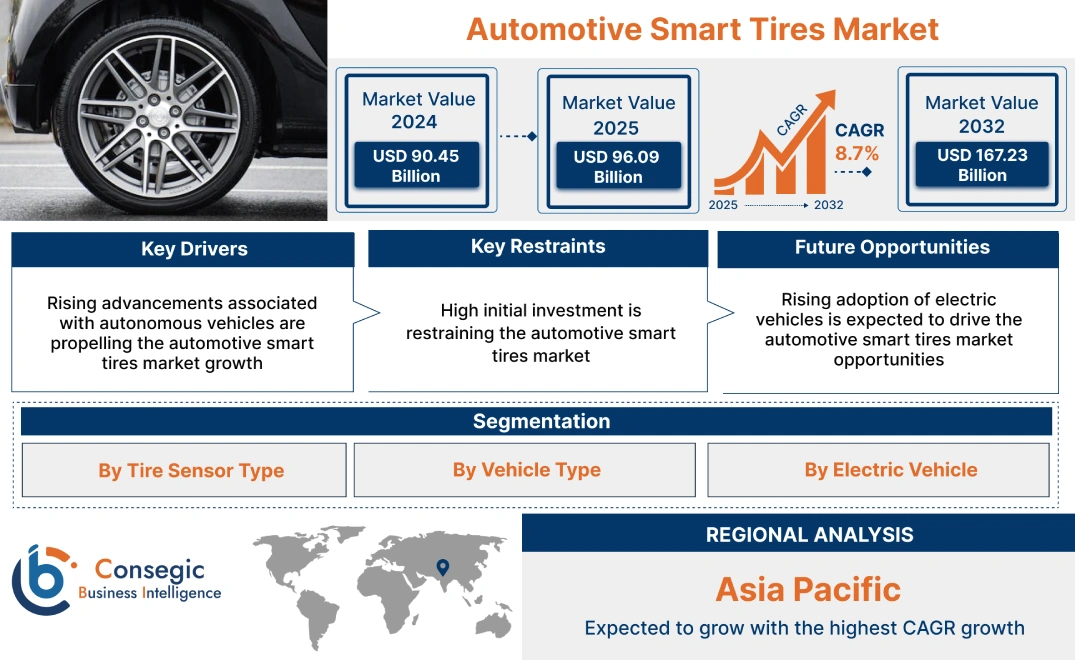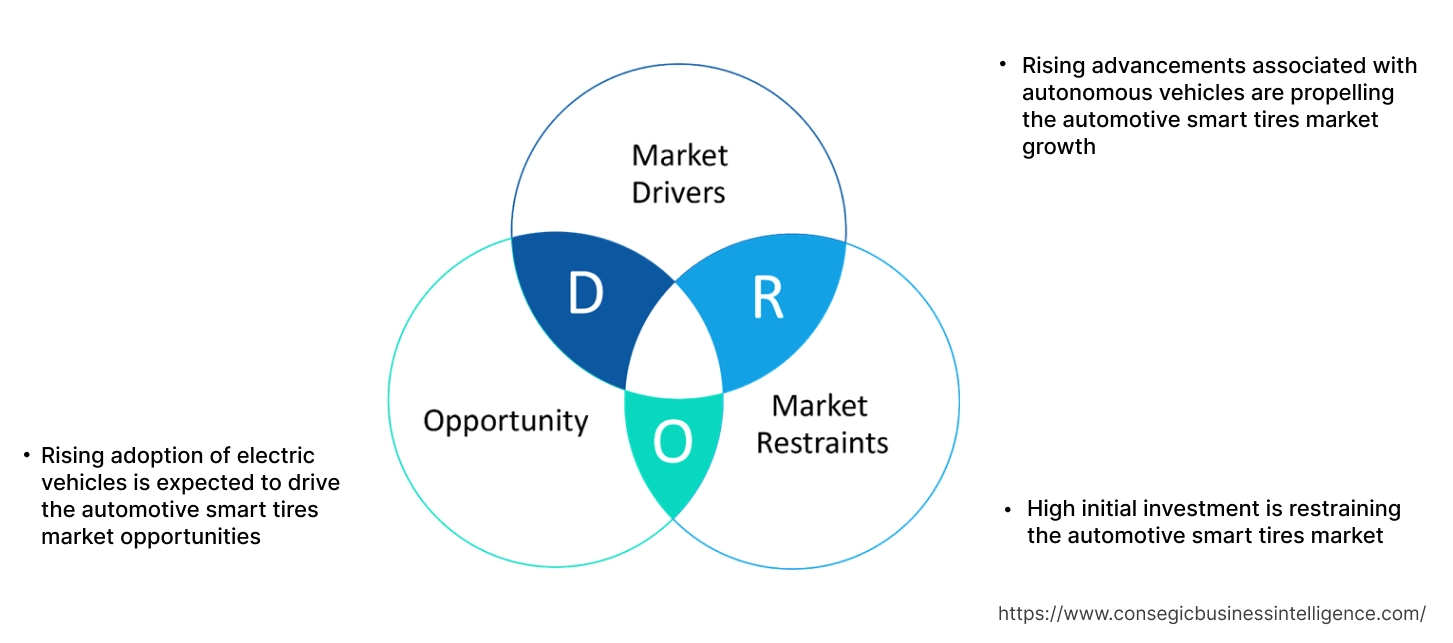Automotive Smart Tires Market Size:
Automotive Smart Tires Market size is estimated to reach over USD 167.23 Billion by 2032 from a value of USD 90.45 Billion in 2024 and is projected to grow by USD 96.09 Billion in 2025, growing at a CAGR of 8.7% from 2025 to 2032.
Automotive Smart Tires Market Scope & Overview:
Automotive smart tires, also known as intelligent tires, refer to advanced tires that integrate sensors and communication systems for monitoring various tire parameters in real time. Smart tires are capable of monitoring and gathering data on several parameters including tire temperature, pressure, and the surrounding environment. Moreover, smart tires offer several benefits including enhanced safety, real-time road condition monitoring, predictive maintenance, and improved vehicle performance among others.
Automotive Smart Tires Market Dynamics - (DRO) :
Key Drivers:
Rising advancements associated with autonomous vehicles are propelling the automotive smart tires market growth
Autonomous vehicles have gained significant popularity in recent years, attributed to their ability to facilitate safer commuting, enhance driving experience, and improve traffic flow among others. Moreover, automotive smart tires play a crucial role in autonomous vehicles, due to their ability to provide real-time monitoring and tracking of vital tire parameters such as tire temperature, pressure, tread depth, and load. This real-time data can be shared with autonomous vehicle's onboard systems to ensure enhanced safety and optimum performance. As a result, the rising advancement associated with autonomous vehicles is driving the market.
- For instance, in October 2024, Tesla introduced the Cybercab, the company’s robotaxi, and also announced plans to commence autonomous driving of its Model 3 and Model Y cars in Texas and California states in the U.S. in 2025.
Therefore, the rising advancements associated with autonomous vehicles are increasing the adoption of smart tires, in turn proliferating the automotive smart tires market size.
Key Restraints:
High initial investment is restraining the automotive smart tires market
High initial investment associated with the integration of smart tire systems and technologies is among the key factors restraining the market. The upfront costs associated with the development of smart tire systems including costs of hardware components, software, and others along with integrating them into vehicles can be considerably high, which may generate financial barriers, specifically for smaller businesses or businesses functioning on tighter budgets.
Furthermore, smart tire systems and technologies often require the attention of specialized technicians for repair in the event of technical issues, which could lead to increased costs and vehicle downtime. Therefore, high initial investments associated with the integration of smart tires are limiting the automotive smart tires market expansion.
Future Opportunities :
Rising adoption of electric vehicles is expected to drive the automotive smart tires market opportunities
Factors including the prevalence of stringent automotive emission regulations, increasing consumer preference for sustainable transportation, along availability of subsidies and tax rebates are leading to significant adoption of electric vehicles (EVs). Moreover, smart tires are being increasingly integrated into modern EVs to improve vehicle performance, safety, and efficiency, which is providing lucrative aspects for market growth.
- For instance, according to the International Energy Agency (IEA), the overall sales of electric cars reached approximately 14 million in 2023, among which China, Europe, and the United States accounted for 95% of the total sales.
Hence, as per the analysis, the rising adoption of electric vehicles is projected to increase the integration of smart tires in modern EVs, in turn driving the automotive smart tires market opportunities during the forecast period.
Automotive Smart Tires Market Segmental Analysis :
By Tire Sensor Type:
Based on tire sensor type, the market is segmented into tire-mounted sensors, valve-mounted sensors, and wheel-mounted sensors.
Trends in the tire sensor type:
- Increasing trend in the adoption of tire-mounted sensors in modern automobiles for facilitating real-time tire monitoring, performance optimization, enhanced safety, and improved fuel efficiency among others
- There is a rising trend towards the integration of valve-mounted sensors in smart tires, attributed to its ease of installation, cost-effectiveness, and improved safety among others.
The tire-mounted sensors segment accounted for the largest revenue in the total automotive smart tires market share in 2024.
- Tire-mounted sensors are attached directly to the inner lining of the smart tire. These sensors are designed for monitoring critical tire parameters such as tire pressure, temperature, tread depth, and others.
- Moreover, the utilization of tire-mounted sensors offers several benefits such as real-time tire monitoring, performance optimization, enhanced safety, improved fuel efficiency, and driving range calculations among others.
- For instance, in November 2022, Sensata Technologies introduced a new tire-mounted sensor for vehicles to deliver improved performance, safety, and data insights.
- According to the automotive smart tires market analysis, the rising innovations associated with tire-mounted sensors are driving the automotive smart tires market trends.
Valve-mounted sensors segment is anticipated to register significant CAGR growth during the forecast period.
- Valve-mounted sensor is a type of tire sensor that is typically attached to the inside of the rim.
- Valve-mounted sensors are used for providing information on tire temperature, pressure, and identification, along with facilitating spare tire monitoring, lock warnings, tire fill assist, and tire burst warnings among others.
- Moreover, valve-mounted sensors offer several benefits such as ease of installation, cost-effectiveness, improved safety and awareness, and others.
- Therefore, the above benefits of valve-mounted sensors are projected to increase its adoption in smart tires, in turn boosting the automotive smart tires market growth during the forecast period.
By Vehicle Type:
Based on the vehicle type, the market is segmented into passenger cars, light commercial vehicles, and heavy commercial vehicles.
Trends in the vehicle type:
- Factors including the rising disposable income, the growing popularity of luxury cars, and progressions in autonomous driving systems are key trends propelling the growth of the passenger cars segment.
- Factors including the rising sales of heavy-duty vehicles, growing investments in light commercial vehicles, and increasing need for economical modes of transportation and logistics are primary determinants for driving the commercial vehicles segment.
Passenger cars segment accounted for the largest revenue share of 58.82% in the overall automotive smart tires market share in 2024, and it is anticipated to register substantial CAGR growth during the forecast period.
- Automotive smart tires are primarily used in modern passenger cars for providing real-time monitoring and tracking of critical tire parameters such as tire temperature, pressure, tread depth, and load.
- Moreover, the real-time data gathered from smart tires can be shared with the passenger car’s onboard systems or advanced driver assistance system (ADAS) to ensure enhanced safety and optimum vehicle performance.
- For instance, according to the International Organization of Motor Vehicle Manufacturers, the total production of passenger cars in Europe reached 15,449,729 units in 2023, representing an increase of nearly 13% in comparison to 2022.
- According to the analysis, the rising passenger car production is driving the adoption of smart tires in modern cars, in turn propelling the automotive smart tires market size.

By Electric Vehicle:
Based on electric vehicle, the market is segmented into plug-in hybrid electric vehicle (PHEV), hybrid electric vehicles (HEV), battery electric vehicles (BEV), and fuel cell electric vehicle (FCEV).
Trends in the electric vehicle:
- Factors including the prevalence of net zero emissions targets in multiple regions worldwide and rising demand for eco-friendly and sustainable automobiles are key aspects driving the battery electric vehicles (BEV) segment.
- Rising technological advancements associated with hydrogen fuel cell electric vehicles are driving the FCEV segment.
Battery electric vehicles (BEV) segment accounted for a significant revenue in the overall market in 2024, and it is anticipated to register the fastest CAGR growth during the forecast period.
- Battery electric vehicles refer to a type of electric vehicle integrated with only rechargeable batteries.
- BEVs utilize motor controllers and electric motors instead of internal combustion engines for propulsion. The energy required to run battery electric vehicles comes from the battery pack which is recharged from the grid.
- Moreover, battery electric vehicles are zero-emissions vehicles that do not generate any harmful emissions or air pollution hazards as compared to traditional gasoline-powered vehicles.
- Further, smart tires are being increasingly integrated into modern battery electric vehicles to improve vehicle performance, safety, and efficiency.
- For instance, according to the International Energy Agency, the total sales of battery electric vehicles (BEVs) in China reached 5.4 million units in 2023, demonstrating a substantial increase of 22.7% in comparison to 4.4 million units in 2022.
- Therefore, the rising adoption of battery electric vehicles is anticipated to drive the market demand during the forecast period.
Regional Analysis:
The regions covered are North America, Europe, Asia Pacific, the Middle East and Africa, and Latin America.

Asia Pacific region was valued at USD 31.24 Billion in 2024. Moreover, it is projected to grow by USD 33.25 Billion in 2025 and reach over USD 59.07 Billion by 2032. Out of this, China accounted for the maximum revenue share of 39.74%. As per the automotive smart tires market analysis, the adoption of smart tires in the Asia-Pacific region is primarily driven by rising government investments in the automotive industry, increasing automobile production, and growing advancements in automotive technologies among others. Additionally, increasing advancements associated with autonomous vehicles and the rising integration of advanced driver assistance systems in modern vehicles are further accelerating the automotive smart tires market expansion.
- For instance, in 2024, BYD, a China-based automobile manufacturer, launched two new electric vehicles, featuring a driving range of 545km and 634km. Both vehicles are integrated with preliminary self-driving/autonomous software and a digital cockpit. The above factors are further propelling the market demand in the Asia-Pacific region.

North America is estimated to reach over USD 44.08 Billion by 2032 from a value of USD 23.68 Billion in 2024 and is projected to grow by USD 25.18 Billion in 2025. In North America, the growth of the automotive smart tires industry is driven by the rising production of automobiles and the increasing adoption of electric vehicles in the region. Similarly, rising advancements associated with autonomous vehicles and a growing shift towards connected vehicles are further contributing to the automotive smart tires market demand.
- For instance, according to the International Organization of Motor Vehicle Manufacturers, the total automotive production in the United States reached 10,611,555 units in 2023, witnessing an increase of 6% as compared to 2022. The aforementioned actors are driving the automotive smart tires market trends in North America.
In addition, the regional analysis depicts that the increasing electric vehicle production, advancements in self-driving vehicles, and favorable government measures for the integration of advanced driver assistance systems in modern vehicles are propelling the automotive smart tires market demand in Europe. Further, according to the analysis, the market demand in Latin America, the Middle East, and African regions is projected to grow at a substantial rate due to factors such as the growing automotive sector along with increasing investments in smart vehicles and related technologies among others.
Top Key Players and Market Share Insights:
The global automotive smart tires market is highly competitive with major players providing solutions to the national and international markets. Key players are adopting several strategies in research and development (R&D), product innovation, and end-user launches to hold a strong position in the automotive smart tires market. Key players in the automotive smart tires industry include-
- Continental AG (Germany)
- Pirelli & C. S.p.A. (Italy)
- Nokian Tyres Plc. (Finland)
- Sumitomo Rubber Industries, Ltd. (Japan)
- Yokohama Rubber Company Limited (Japan)
- Hankook Tire & Technology Co., Ltd. (South Korea)
- The Goodyear Tire & Rubber Company (U.S)
- Michelin Group (France)
- Bridgestone Corporation (Japan)
- Toyo Tire Corporation (Japan)
Recent Industry Developments :
Partnerships & Collaborations:
- In December 2024, Michelin Group partnered with Beontag for the development of RFID (radio-frequency identification)-enabled smart tires. The partnership will enable the company to integrate RFID technology in its passenger and commercial vehicle tires over the next two years.
Automotive Smart Tires Market Report Insights :
| Report Attributes | Report Details |
| Study Timeline | 2019-2032 |
| Market Size in 2032 | USD 167.23 Billion |
| CAGR (2025-2032) | 8.7% |
| By Tire Sensor Type |
|
| By Vehicle Type |
|
| By Electric Vehicle |
|
| By Region |
|
| Key Players |
|
| North America | U.S. Canada Mexico |
| Europe | U.K. Germany France Spain Italy Russia Benelux Rest of Europe |
| APAC | China South Korea Japan India Australia ASEAN Rest of Asia-Pacific |
| Middle East and Africa | GCC Turkey South Africa Rest of MEA |
| LATAM | Brazil Argentina Chile Rest of LATAM |
| Report Coverage |
|
Key Questions Answered in the Report
How big is the automotive smart tires market? +
The automotive smart tires market was valued at USD 90.45 Billion in 2024 and is projected to grow to USD 167.23 Billion by 2032.
Which is the fastest-growing region in the automotive smart tires market? +
Asia-Pacific is the region experiencing the most rapid growth in the automotive smart tires market.
What specific segmentation details are covered in the automotive smart tires report? +
The automotive smart tires report includes specific segmentation details for tire sensor type, vehicle type, electric vehicle, and region.
Who are the major players in the automotive smart tires market? +
The key participants in the automotive smart tires market are Continental AG (Germany), Pirelli & C. S.p.A. (Italy), Hankook Tire & Technology Co., Ltd. (South Korea), The Goodyear Tire & Rubber Company (U.S), Michelin Group (France), Bridgestone Corporation (Japan), Toyo Tire Corporation (Japan), Nokian Tyres Plc. (Finland), Sumitomo Rubber Industries, Ltd. (Japan), Yokohama Rubber Company Limited (Japan), and others.



